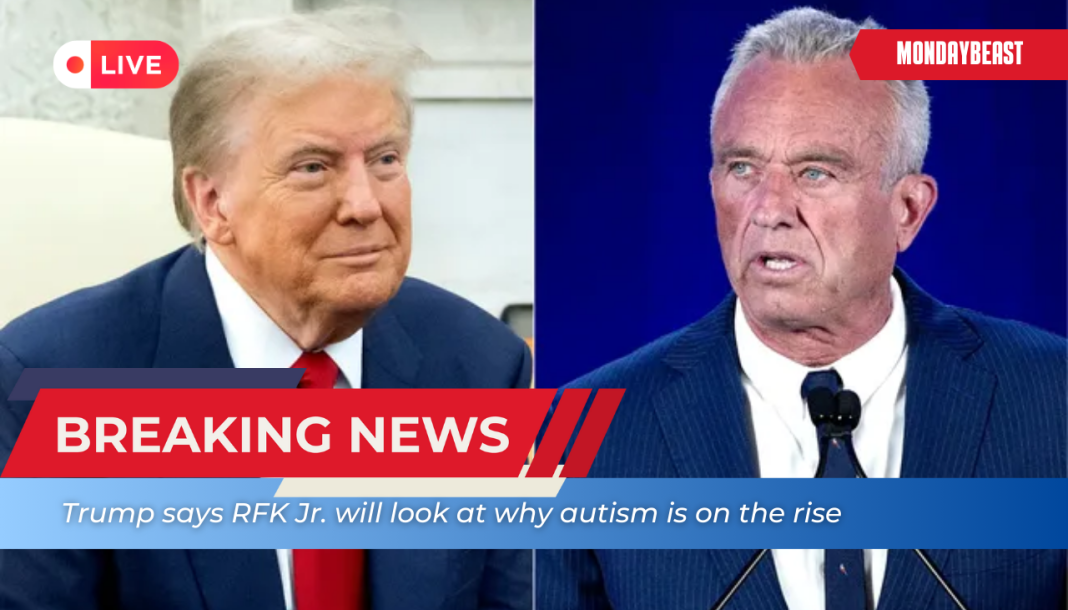In a recent conversation that went from the mundane to the controversial, Donald Trump made headlines by bringing Robert F. Kennedy Jr. into a significant role. This was no small detail. Trump’s comments on the rising autism rates struck a chord, igniting discussions across America.
“Something is going on,” Trump said, casting a wide net of inquiry. It’s a statement that many parents can relate to. Whether you’re a mother of a child diagnosed with autism or a healthcare professional navigating this complex landscape, the question resonates: what’s really happening?

Trump proposed that Kennedy would investigate the health impact of vaccines. It’s a bold move, especially considering Kennedy’s long-standing reputation as a vocal critic of vaccines. He didn’t shy away from the challenge, but that raises another question: how can we ensure that the investigation remains unbiased?
Kennedy, part of an esteemed political lineage, is not just a face but a figure well-versed in the nuances of this debate. His skepticism toward the measles, mumps, and rubella vaccine has become a focal point of his advocacy. Skepticism, however, must be balanced with scientific evidence. It’s a delicate dance, one that requires both open ears and an even clearer mind.
Trump himself has flip-flopped on the vaccine debate over the years. He once labeled himself a vaccine skeptic but later claimed, “Vaccines are incredible, but maybe some aren’t.” That’s an interesting statement from a leader whose views can sway public opinion massively. It raises an alarm—what implications could this line of thinking have on public trust?

As the autism rate skyrockets, from 1 in 150 children in 2000 to 1 in 36 in 2020, parents understandably grow anxious. Many feel overwhelmed, but public health experts suggest that this surge isn’t just about a vaccine-autism link. Rather, it reflects changes in diagnosis standards. Today, more children receive diagnoses than ever before.
What a tangled web we weave! The myth linking vaccines and autism largely stems from a discredited 1998 study by Andrew Wakefield. His claims were soundly debunked, and the scientific community largely rejected his findings. Yet, the narrative persists. Why is that? Misinformation is persistent, and claims often gain traction quicker than corrections.
To add another layer, Trump mused about potential environmental factors. “Maybe it’s chlorine in the water,” he suggested. It’s true that environmental toxins may lead to health concerns, but attributing rising autism solely to environmental changes or vaccines misses a nuanced discussion.

For concerned parents, finding trusted resources can be frustrating. Media narratives can shift quickly, leaving many to wonder who to trust. The ongoing dialogue on vaccination and health issues is critical. It’s not just ‘us versus them’; it’s about making informed decisions.
As this conversation evolves, it affects the very fabric of healthcare in America. Perhaps it’s time we focus on collaboration among health experts, families, and policymakers. Can we navigate our way toward a more solid evidence-based understanding of autism?
It’s vital that investigations like Kennedy’s proceed carefully. Open conversations—grounded in research and data—need to take the forefront. Only then can we move toward clarity in what seems to be a dark and confusing maze.
In the end, the implications of Trump and Kennedy’s inquiry reach far. How many lives will be touched by their findings? And will it lead to breakthroughs or further disagreements? The stakes are high.




